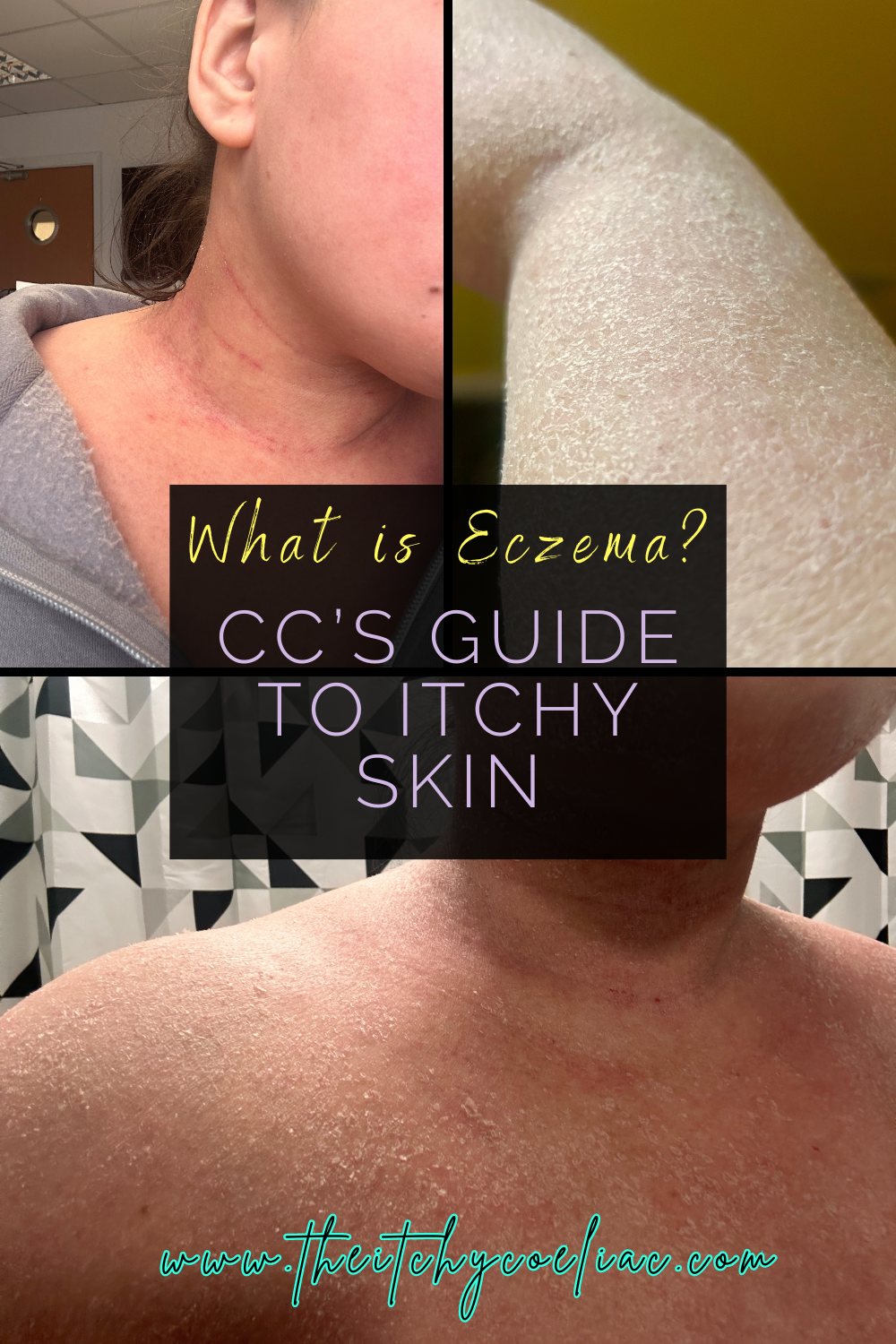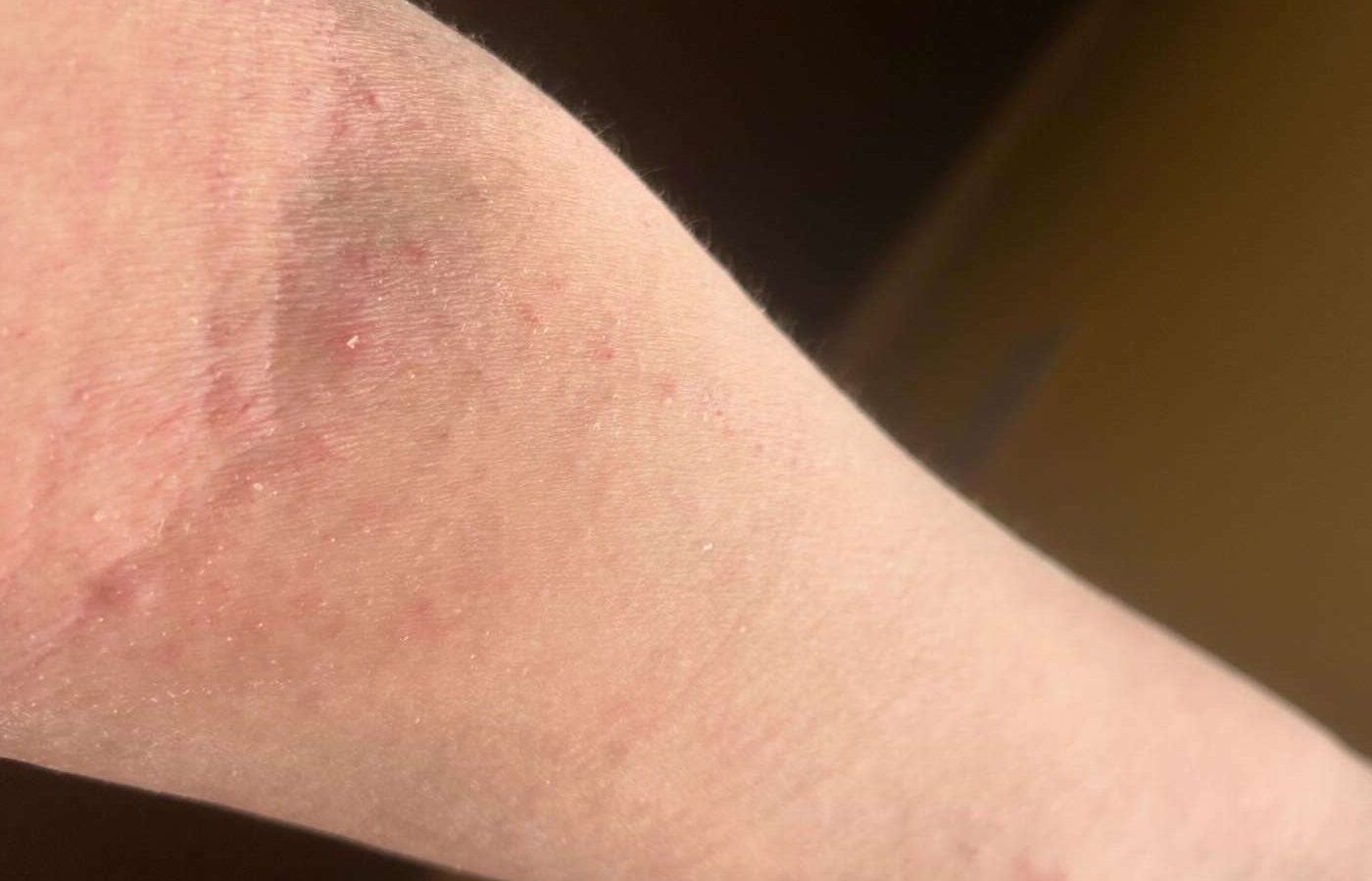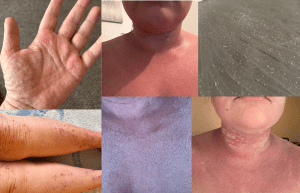Have you spent your life wondering why your skin is so damn itchy? Have you heard the phrase but aren’t quite sure what Eczema is? Do you want a better understanding of the condition so you can learn how to manage your Eczema better? Well this post is here to help with all of that!
I’ve been living with Eczema my entire life and in my 26 years, I’ve picked up a thing or two about how to manage it, what can trigger it and odd bits and pieces that are just helpful to know. I’ve put it all in this helpful guide so that it can hopefully answer some of your burning questions!
Pin it for later!
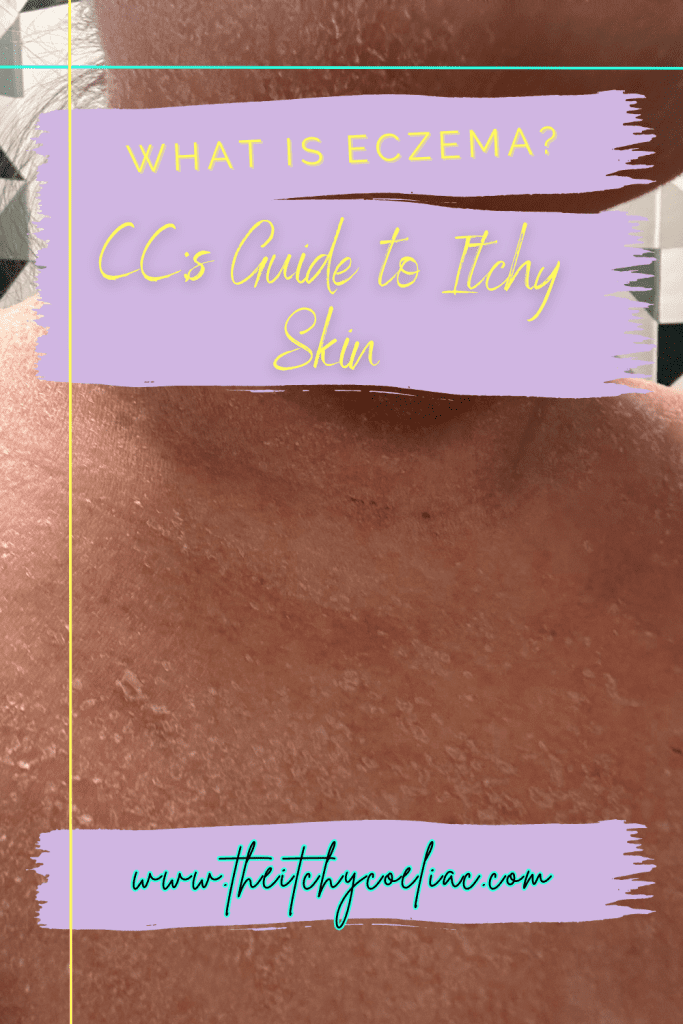
So What Does ‘Eczema’ Mean?
Eczema is a chronic, long-term skin condition which causes the skin to become dry, cracked and sore. There are a few different types of Eczema, the most common being Atopic Eczema. (This is mainly the one I suffer with!)
Atopic Eczema is when the rashes, itching and dryness is generally caused by allergens. Allergens which can cause a reaction from your skin. This could just affect a small patch of skin, or it can be spread over various areas of your body.
I am what my family affectionately named ‘an allergy kid’ so it was natural that my skin was no exception!
My Eczema initially presented itself as red, itchy, rashes on the inside of my elbows and back of my knees. As I got older, it developed into full body rashes, dry, flaky, skin and open wounds and sores.
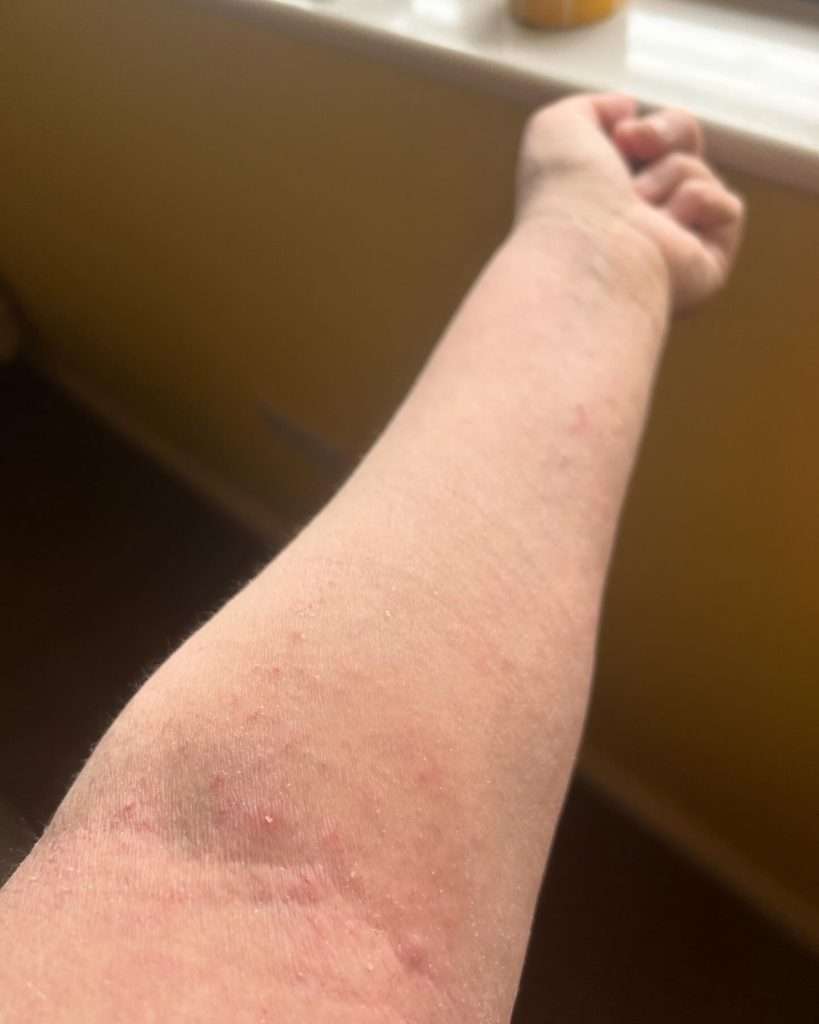
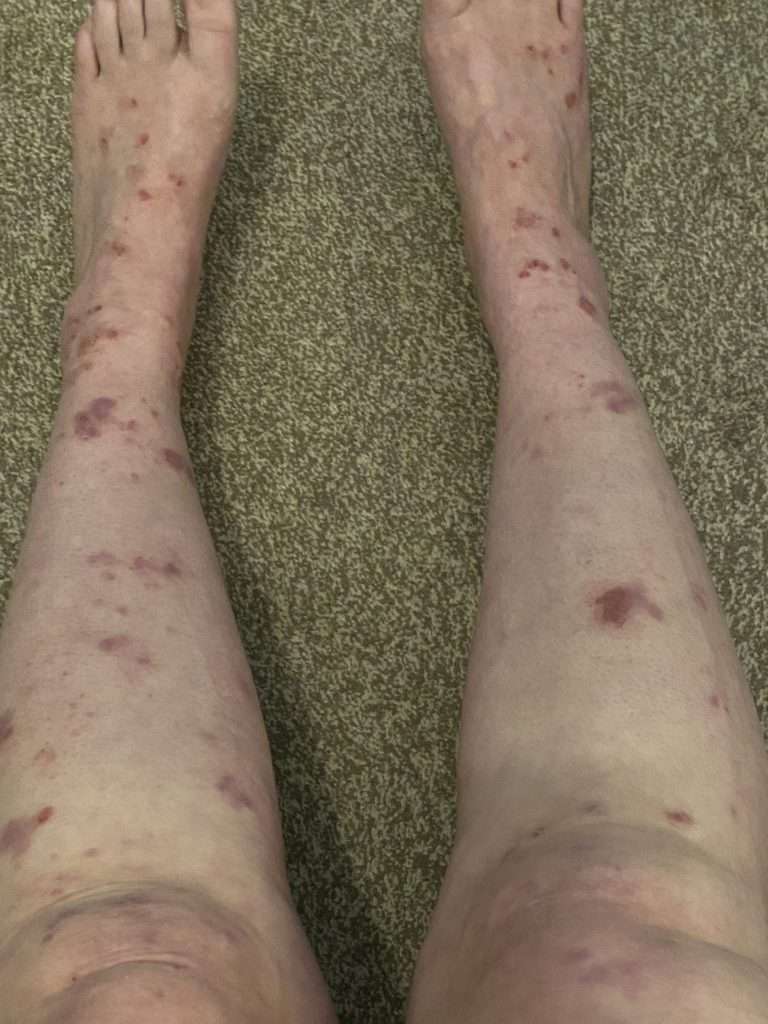
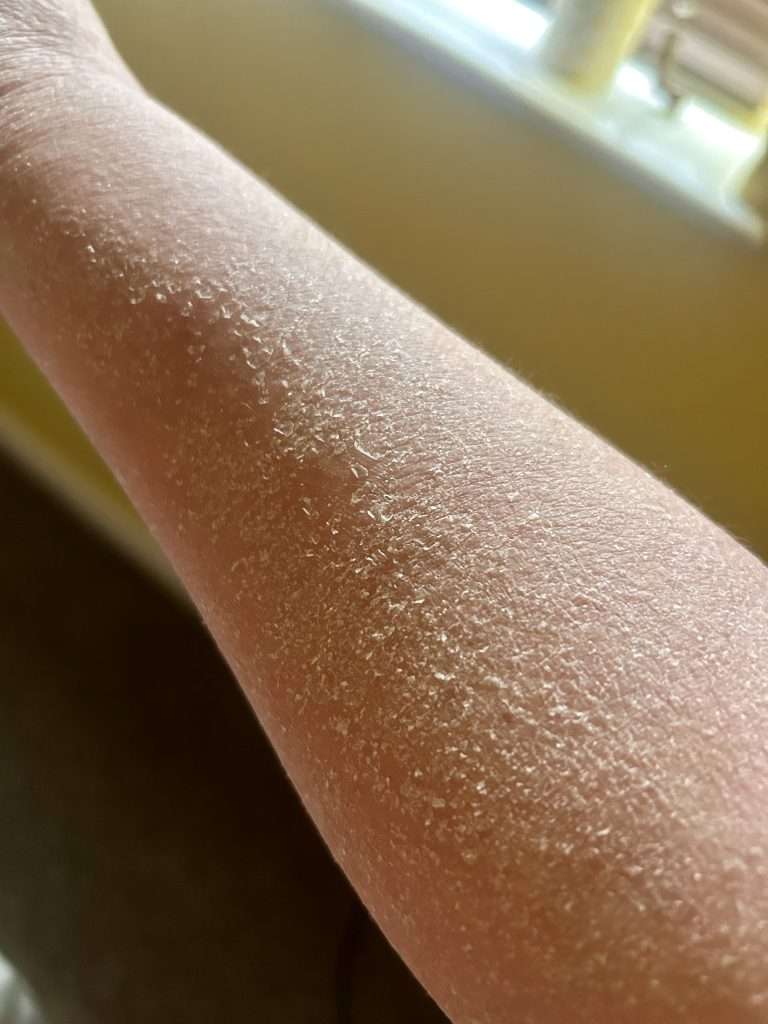
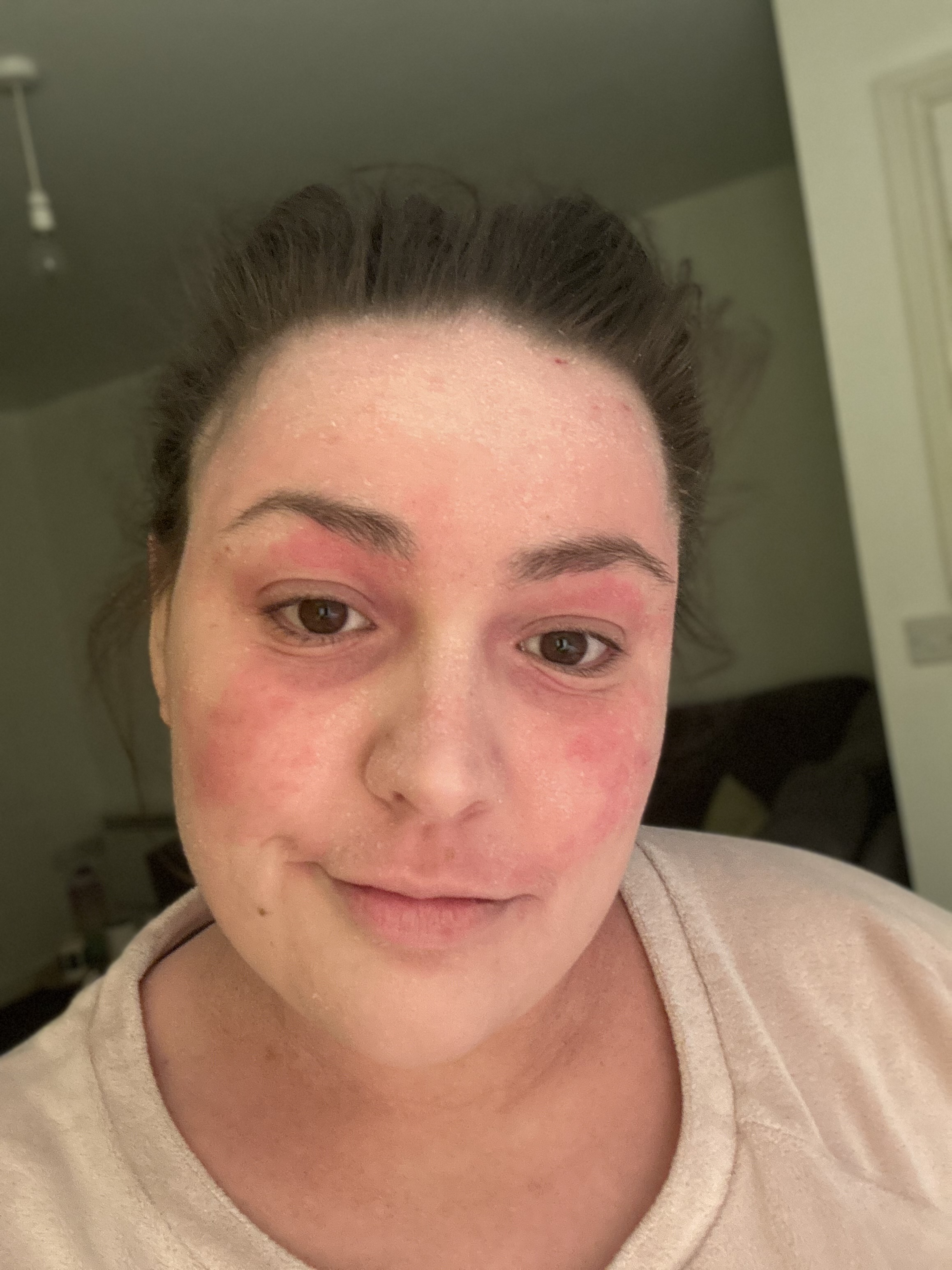
A lot of people upon hearing the word ‘Eczema’ picture that skin rash and that’s it. But I’m here to explain that Eczema is so much more than a rash!
This is something that I think is incredibly important to talk about because it often is not talked about. Then something that is a hugely debilitating condition is watered down to ‘just a rash’.
Eczema can be very isolating and comes with tons of hidden symptoms. I’ll go into a few of them further into this post.
So what is Eczema? In short, it’s a chronic skin condition which presents itself mainly in the form of dry, itchy, irritated skin and comes with a boatload of fun problems. Simple, right? Keep reading to find out just how not simple it is…
So what are the symptoms of Eczema?
Eczema symptoms tend to vary from person to person so this can be a difficult one. But there are some symptoms which tend to appear in pretty much 99% of Eczema cases. Some of the most common symptoms include:
Itchy, red and inflamed skin
This can appear in localised patches or it can be spread all over the body. As I said earlier, mine began in the sweaty bits – the inside of my elbows and behind my knees. These tend to be common places that Eczema can occur. Hands are also pretty common as they come into contact with a lot of irritants.
Dry, flaky skin
With Eczema, the skin can become extremely dry as your skin barrier is unable to retain moisture. This causes it to feel very tight and become flaky. Flaky skin is the bane of my life. Generally, the idea is that if it’s flaking – it’s healing. But that still doesn’t stop it from being a big pain in the behind! Bedsheets – that’s all I’ll say for now. If you know, you know.
Open sores or wounds
If you have more severe Eczema, it can lead to open sores and wounds. This is mainly caused when you scratch and cause breaks in the skin. Also, when your skin is particularly dry it can crack. (I’ve found this happens particularly in the winter!)
These are the most common symptoms of Eczema and the ones that tend to pop up when you search for ‘Eczema symptoms’.
And while they are very important and useful to know about, there are a whole load of symptoms which I feel don’t get the attention they deserve. Such as…
Sleep deprivation
Itching that itch can be a full time job and if your Eczema is anything like mine, it ramps up hard during the night. Most nights, I’m woken by my skin and usually more than once. Not getting enough sleep is a common Eczema symptom that is often overlooked.
I go into a bit more detail on how Eczema can affect your sleep in my post Who Needs Sleep When You Have Eczema?
Lack of concentration
Again, this one links back to that insatiable itch that is, in my opinion, the biggest symptom of Eczema. When you’re at school or at work and it feels like there’s something running around under your skin it can make it very difficult to focus.
I know for me personally, my mind often drifts when I’m sitting at my desk as I notice the itching feeling creeping around. Particularly when my face is flaring, as this is often a place that can be very difficult to discreetly scratch.
So instead I’m willing myself not to touch it, all the while the only thing I can think about is how much I want to itch! My work? It becomes a lost cause.
Mental Health Effects
One of the most difficult Eczema symptoms I’ve had to overcome is the mental health problems that it has. Suffering with Eczema is a mental battle, you’re literally fighting your body to gain control of your skin and that can be exhausting (especially when you factor in sleep deprivation!). Anxiety and Depression are just some of the possible symptoms that can come from having a skin condition.
The mental health side of Eczema is a massively important topic that is not talked about enough.
If you want to read more on it, I get into it in a lot more detail in my post 5 Ways Eczema Can Affect Your Mental Health.
That’s just an overview of some of the symptoms that can come from having Eczema. As I said before, each case can be different so you may not get every symptom. There are loads more out there and I really want to get into that a bit more so I do have plans to write a post on that topic very soon!
So what causes Eczema?
This is one of those questions that I find extremely difficult to answer. Whenever someone asks me, “Why is your Eczema flaring?” or “What’s caused your Eczema?” I find myself at a loss for words.
Mainly because, the answer to this is usually one of two things.
Everything.
or
I don’t know.
The root cause of Eczema is that your skin barrier fails to retain moisture and that’s what causes the skin to become dry. When your skin is dry, it’s highly irritable and when it reacts to certain triggers that’s what causes that super persistent itching feeling. Then, as outlined in the symptoms section, you itch, you cause breaks in the skin and it tends to go round in a great big vicious circle.
When broken down, Eczema is caused by a whole range of different triggers. These can be changes in environment or weather, allergies, clothing material, irritants found in soaps and detergents and emotional changes such as stress or hormones.

There are some really smart people out there who, through an elimination style experiment, have worked out what their triggers are and so are able to limit their exposure to them. For example, they might suspect that their washing detergent is causing their skin to flare. They would stop using it and see if the flare disappeared and that would indicate to them that it was a possible Eczema trigger.
I most definitely am not that smart and so I don’t have a comprehensive list of things that trigger my Eczema. In my experience, it always seemed like the list of triggers was never ending and my limited patience struggled with trying and testing everything.
But the longer you have Eczema, the easier it becomes to recognise what has caused a flare up. You start to recognise what exactly might have changed in your life or environment which might have caused that particular reaction. And from there, you can look at how to avoid or reduce your exposure to them!
So what Eczema treatments are there?
Creams, Creams and More Creams
One of the biggest Eczema treatments that I have used in my life is creams. Moisturisers, emollients, ointments and something that felt like I was covering myself in butter (and not the nice fancy shea butter kind!).
One of the key components to treating Eczema is to give your skin moisture. The more moisture it gets, the less likely it is that it will become sore and dry. In this way, creams and moisturisers are your best friends.
I go through at least two to three big bottles of Epaderm cream per week. I also carry the Balmonds Skin Salvation ointment everywhere I go for when I need a quick moisture hit during the day.
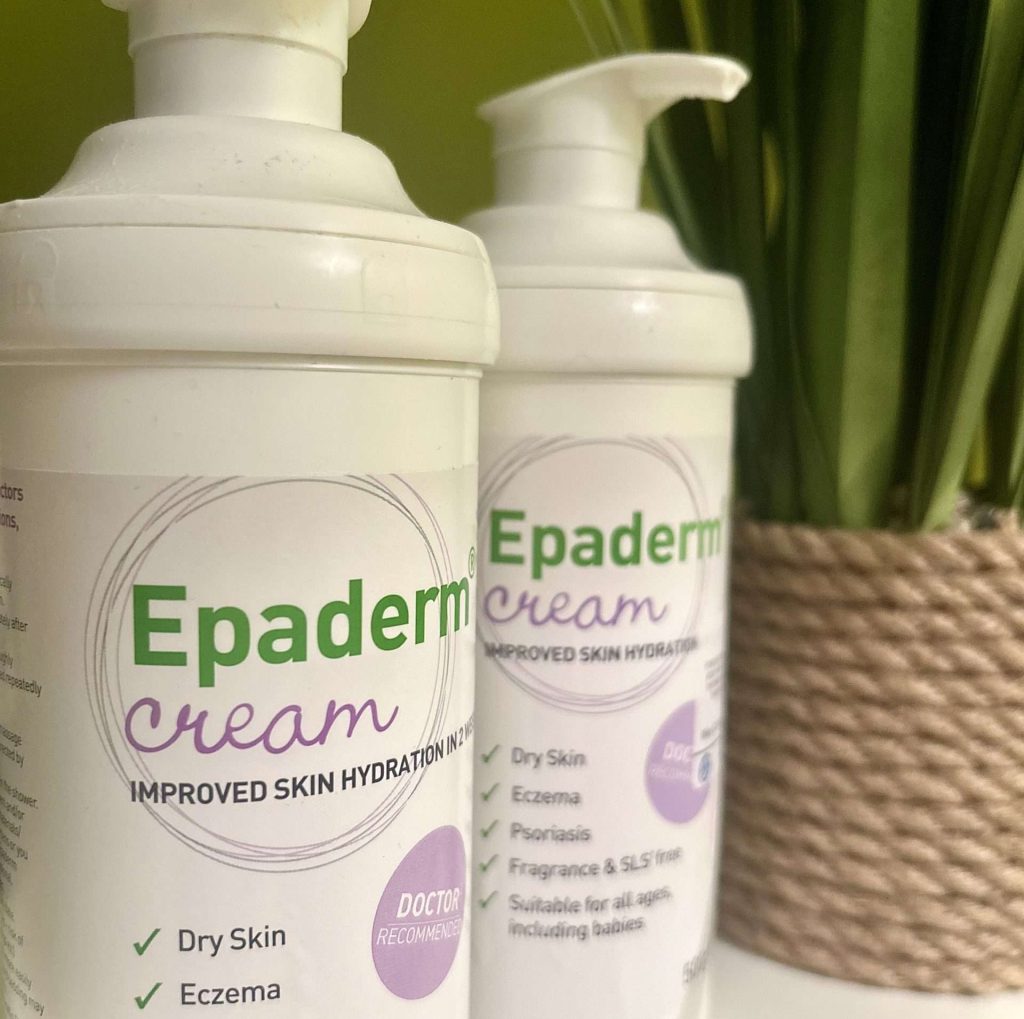
Light Therapy
While this was only something I tried for a short time, I know loads of other Eczema sufferers who swear by light therapy.
Basically, you expose the affected areas of your skin to UV light which reduces the body’s inflammatory response. It has shown to be effective in alleviating the effects of Eczema such as the red inflammation and the itching.
Usually, this treatment is only recommended after you’ve been trying to manage your Eczema with emollients and topical steroid treatments. If those have proven to be no use, then your dermatologist might suggest trying light therapy.
The treatment is administered at specialist clinics, in sessions of between 2 and 4 weeks. You have the therapy 3 times a week, starting at 30 seconds of exposure and slowly increasing as your treatment continues.
Changes to Diet
Changing your diet can sometimes be beneficial to the improvement of your Eczema – but not always!
Some people identify that there are certain foods that trigger their skin and so have eliminated these from their diets. I think some of the most common ones are gluten, dairy and sugar.
There are a number of foods out there that people have identified as having properties which might cause your Eczema to get worse. It’s definitely worth having a look into if you’re trying to work out why your skin keeps flaring after you have your favourite meal!
Medication
There are a number of different medications that you can be prescribed to help the symptoms of Eczema, from antihistamines to immunosuppressants.
I will fully admit, I personally don’t know much about this side of treatment. My dermatologist/doctor never offered me medication. Why? Who knows but I do know a number of people that have been treated this way. Some have had great results, others haven’t noticed much of a change.
With all Eczema treatments it can be subject to each person and their own bodies. Some might react brilliantly to light therapy while others might find it makes things worse. Some might swear up and down that their medication is the cure for Eczema while another will say they saw no change.
It’s very much a trial and error situation with managing your Eczema. But don’t let this dishearten you! Eventually, maybe even right away, you will find what works for you and you’ll show that itchy skin who’s boss!
One type of treatment that I haven’t mentioned yet is the use of topical steroids. The reason I haven’t mentioned these is because I am very much of the opinion you should not use them. Topical Steroid Withdrawal is a huge issue that so many people are dealing with and I wouldn’t wish it on my worst enemy.
You can read more about TSW in my post What is Topical Steroid Withdrawal? You Need to Know!
So what have we learned?
Well, we know that Eczema is a chronic skin condition which presents itself as dry, itchy, irritated skin. It can often show as open wounds or flaky or scaly skin.
We know that it can cause problems sleeping, lack of focus and mental health issues.
It can be caused by a number of factors or triggers such as:
- Environment, weather
- Clothing
- Soaps, scented products, detergents
- Food
- Stress
- Anything and everything!
We know that some of the treatments available include:
- Emollients and ointments
- Light therapy
- Change in diet
- Medication
That’s essentially the basics of Eczema but really it just scratches the surface of the skin condition. (No pun intended…okay maybe a little bit!)
There is so much more to discuss when it comes to Eczema and I hope to talk about it all!
From the sting of the shower, to the hoovering of the bedsheets. From the exhausted, dark days, to the way your heart soars when you wake up and look in the mirror to find that today’s going to be a good skin day.
You can find out more about my own personal Eczema journey in my post ‘Living With Eczema: The Good, The Terrible and The Itchy’.
So make sure to stick around by subscribing to my email list and look out for more of my posts delving into the itchy, flaky world of Eczema!
Are there any questions that you have about Eczema? Something you’d like to have explained in more detail? Leave a comment or send me a message on my social media!
Like this post? Why not pin it!
